|
This summer, Sarah Tuchel, and I will be traveling to London to present some of our work at the British Society of Aesthetics (BSA) Workshop on the Art & Aesthetics of Illusions, funded by BSA and co-sponsored by the Science of Magic Association (SoMA) and in collaboration with The Magic Circle Foundation (TMCF) and The Magic Circle (TMC). In collaboration with Gustav Kuhn and Dan Simons, we've been interviewing expert magicians in an attempt to find the boundaries of performance magic. Where does magic end and some other performance art begin? Here is the abstract for our presentation: 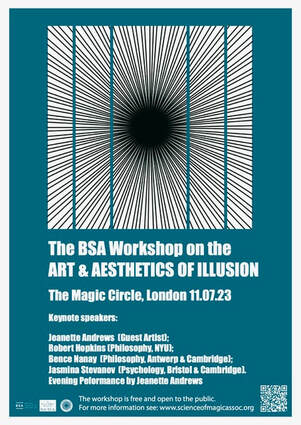 “[Magic] is so big that a simple definition seems impossible, so vague as to be an empty vessel waiting to be filled with meaning. How are we to determine what we are talking about when we use the word magic?” (Neale & Parr, 2002, The Magic Mirror, p. 6) Aside from The Magic Mirror, few published works in magic directly address magic’s underlying aesthetics or its theoretical basis. Instead, information is transmitted informally between magicians through lectures and personal conversations (see Rissanen et al., 2013). In order to try to capture some of this socially-disseminated information, we carried out a series of interviews with acclaimed, expert magicians. In these interviews, we probed their personal definitions of magic, their beliefs about what constitutes “good” and “bad” magic, and their attitudes about the aesthetic boundaries of performance magic. We report the outcomes of a thematic analysis of these interviews, highlighting points of agreement and disagreement across this small sample of experts in hopes that they will be a boon to future research in the Science of Magic. We will make the full text and video of these interviews publicly available (with participant consent) through the Science of Magic Association website.
0 Comments
I had a fun conversation with my friend, Andy Luttrell, on his "Opinion Science"podcast. We covered a lot of ground, from magic and mentalism to attention to education to skepticism. Andy's pedigree is similar to mine; he was a mentalist before he was a psychologist. Consequently, we went down some fun rabbit holes. As the kids say, "smash that 'like' button and subscribe" to Andy's podcast.
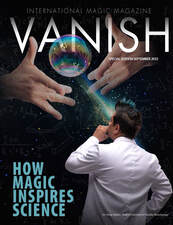 Today, September 2, 2022, is World Magic Day. Coincidentally, it also marks the release of a special issue of Vanish Magazine devoted to the interaction of science and magic. The issue includes a piece by me, exploring the pedagogical value of using magic in the classroom. It also includes pieces from many of my friends and colleagues, including Gustav Kuhn, Jason Leddington, Jeanette Andrews, Jamy Ian Swiss, and Richard Wiseman. The issue is free to download at https://joom.ag/IjId.
I had a lengthy conversation with Milena Korostenskaja for her Neurocareers Podcast...So lengthy that it will be broken into two parts! We covered a lot of ground, from the science of magic to how undergraduate students can set themselves up for success in graduate school and on the job market. The first part is out now. I'll update this post once the second part becomes available.
08/29/2022 Update: And Part 2 is now available!
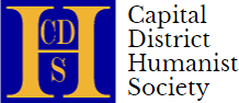 I'll be presenting my "Magic in the Lab" talk virtually for the Capital District Humanist Society on August 14th at 1pm Eastern Time. The event is free and open to the public with registration. To register, send an email request to w[email protected] several days prior or login to their Meetup page: https://www.meetup.com/Capital-District-Humanist-Society/. Click on Join, then on Attend, and use the RSVP function. The Zoom link will then be available to you. Update: Video from this presentation is available below! 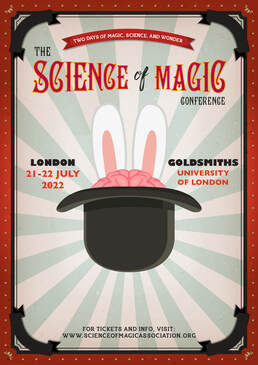
It's been three years since I hosted the Science of Magic Association conference in Chicago. After our pandemic-induced hiatus, the SoMA committee is excited to host our third biennial(ish) conference in London next month. For my part, I will be presenting data from my newest publication, in press at Psychology of Consciousness. It will be officially released in September, appearing in a special section devoted to understanding consciousness through the science of magic. We have an incredible line-up of peer-reviewed presentations and keynote addresses. You can peek at the conference program here. See you on the other side of the pond!
Update: Video from my presentation at #SoMA22 appears below. I am pleased to announce the publication of some research that has been a decade in the making. We set out to find concrete evidence of self-deception among performing magicians, but we ended up finding something arguably more interesting! This work was carried out in collaboration with Kaitlyn Richardson and Shawn Eric. Kaitlyn was an undergraduate working in my lab. She is now in law school at the University of Nebraska. Shawn Eric is a professional magician living in Phoenix. This work is being published in a special section of Psychology of Consciousness devoted to the science of magic. https://doi.org/10.1037/cns0000321
Updates: This research has now been featured in a few popular media stories, linked below.
The entire special section has also been packaged together in an open-access format by the Science of Magic Association. You can read all the pieces, including mine, at https://scienceofmagicassoc.org/blog/2022/10/11/soma-special-section-2022. I had the pleasure of moderating a rich conversation on magic and creativity for the Science of Magic Association. My panelists were an international group of magicians and creativity researchers including David Parr, Cyril Thomas, Matt Pritchard, and Amory Danek. The video is available below, and accompanying content is available at https://scienceofmagicassoc.org/blog/2021/8/23/magic-creativity-webinar. Jeniffer Ortega, my collaborator at the Universidad Nacional de Colombia is building a nice research program exploring metacognition as it relates to attention and perception. Along with Patricia Montañes, Gustav Kuhn, and me, she has published new work in i-Perception showing that people's metacognitive judgments are heavily biased by their own experiences. People who experienced change blindness or inattentional blindness were more likely to think others would experience the same. Dr. Ortega's paper is open access at https://journals.sagepub.com/doi/10.1177/20416695211039242.
On May 27, 2021, I will be contributing to a virtual symposium at Poland's Jan Dlugosz University, where the science of magic will be an emerging theme. The event is free and open to the public, with registration. I will be accompanied by some familiar faces from the Science of Magic Association, including Richard Wiseman and Vebjørn Ekroll. Details and registration at http://wns.ujd.edu.pl/art,826,scientific-symposium-evening-with-psychology-3-international-edition-27052021
My lab group will have a considerable presence at the 2021 virtual meeting of the Midwestern Psychological Association. If you're attending, I encourage you to pitch some questions to my students! I've linked to relevant materials below. Note that my presentation won't be viewable until 8:30am on 4/22/21.
I was interviewed by Eric Hunley on his "Unstructured" livestream on topics from magic to skepticism to handwriting and more. https://youtu.be/UgMgE1gOaDs I contributed a brief tutorial to the Society for the Teaching of Psychology's 2020 Teaching Tips book on a magic trick that I frequently use in the classroom to inspire critical thinking. The entire book is available FOR FREE at http://teachpsych.org/ebooks/teachingtips4.
I was interviewed on the Society of American Magicians "Backstage" podcast. It was a really fun chat about the history of interaction between scientists and magicians. Enjoy!
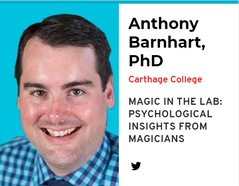 I am honored to be featured as a "Thought Leader" at the 2020 convention of the American Psychological Association. My keynote address, entitled "Magic in the Lab: Psychological Insights from Magicians," will be a call to action for psychologists to seriously consider hypotheses from the folk psychology of magic. Update: Video of my virtual keynote address is available here. |
AuthorI am an Associate Professor of Psychological Science at Carthage College, in Kenosha, Wisconsin. Archives
February 2024
Categories
All
|
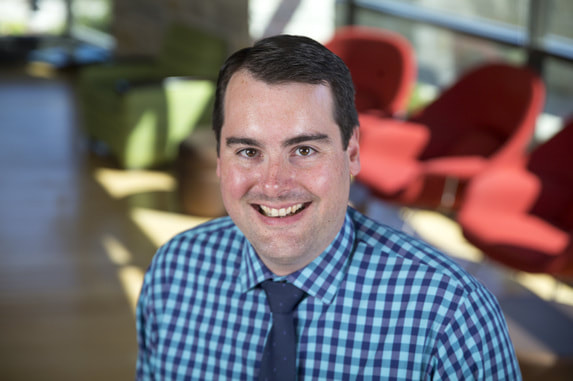
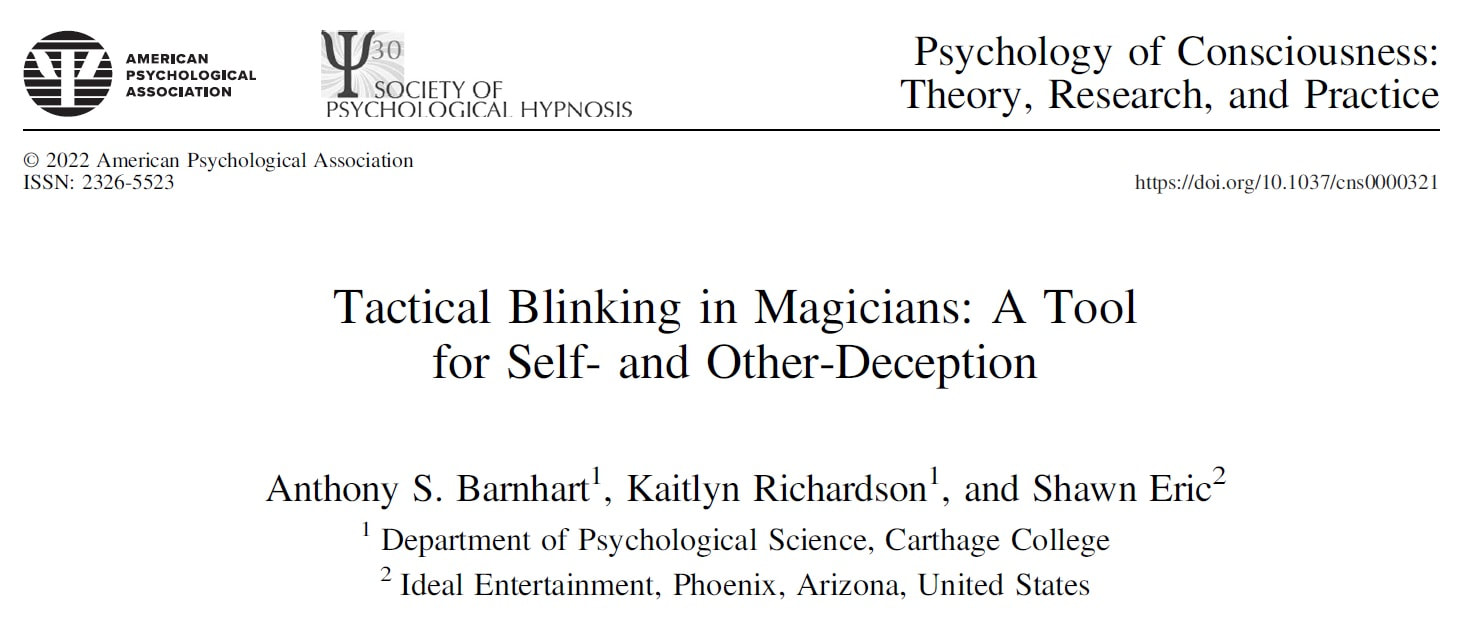
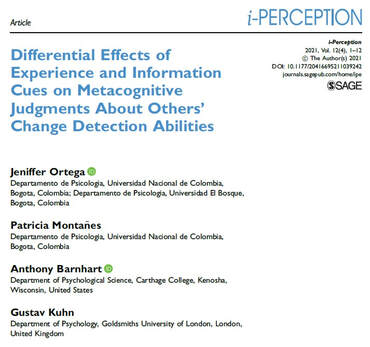
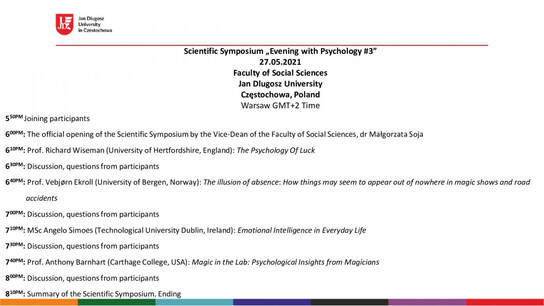
 RSS Feed
RSS Feed
